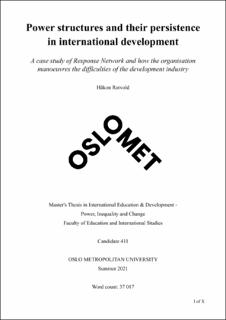| dc.description.abstract | This thesis examines the dynamic created by opposing mechanisms in international development. It is expected that both funders and facilitating organisations in development approach it with a participatory mindset. By including recipients of development in decision-making processes, the international community believes this will lead to sustainable development. At the same time, we can see increasing demands for reporting and accountability for facilitating organisations. Funders want to know their money is going to the right cause and not being used for undesired activities. Then, how can organisations continue to do participatory development while funders continue to press for upward accountability? Without accountability to recipients, no one wants to make choices based on their recipients' opinions. It is instead the need for funds that drive international development in this case. This thesis focuses on the organisation Response Network and its funders. The organisation is unique because of its impressive record of providing participatory development to recipients in southern Zambia. They call their program "self-help facilitation." The organisations rests upon good relationships with both recipients and funders. It was founded in 2004 and has remained focused on self-help. The task for this thesis is, then, how does Response Network's position within aid chains affect its possibilities for implementing a radical self-help facilitation programme? Can these organisations escape the contrasting mechanisms persistent in international development? This research shows that while the programme Response Network fronts are participatory, they cannot implement a radical self-help programme without adhering to the power structures at play. A difference appears when analysing power structures in partnerships with private companies and development institutions. Response Network has been able to influence its programme when cooperating with a private company. Response Network cannot function properly as a development organisation without the support of development institutions. Primarily because of the funds they provide and the knowledge and agency cooperating with partners provide for Response Network. | en_US |
